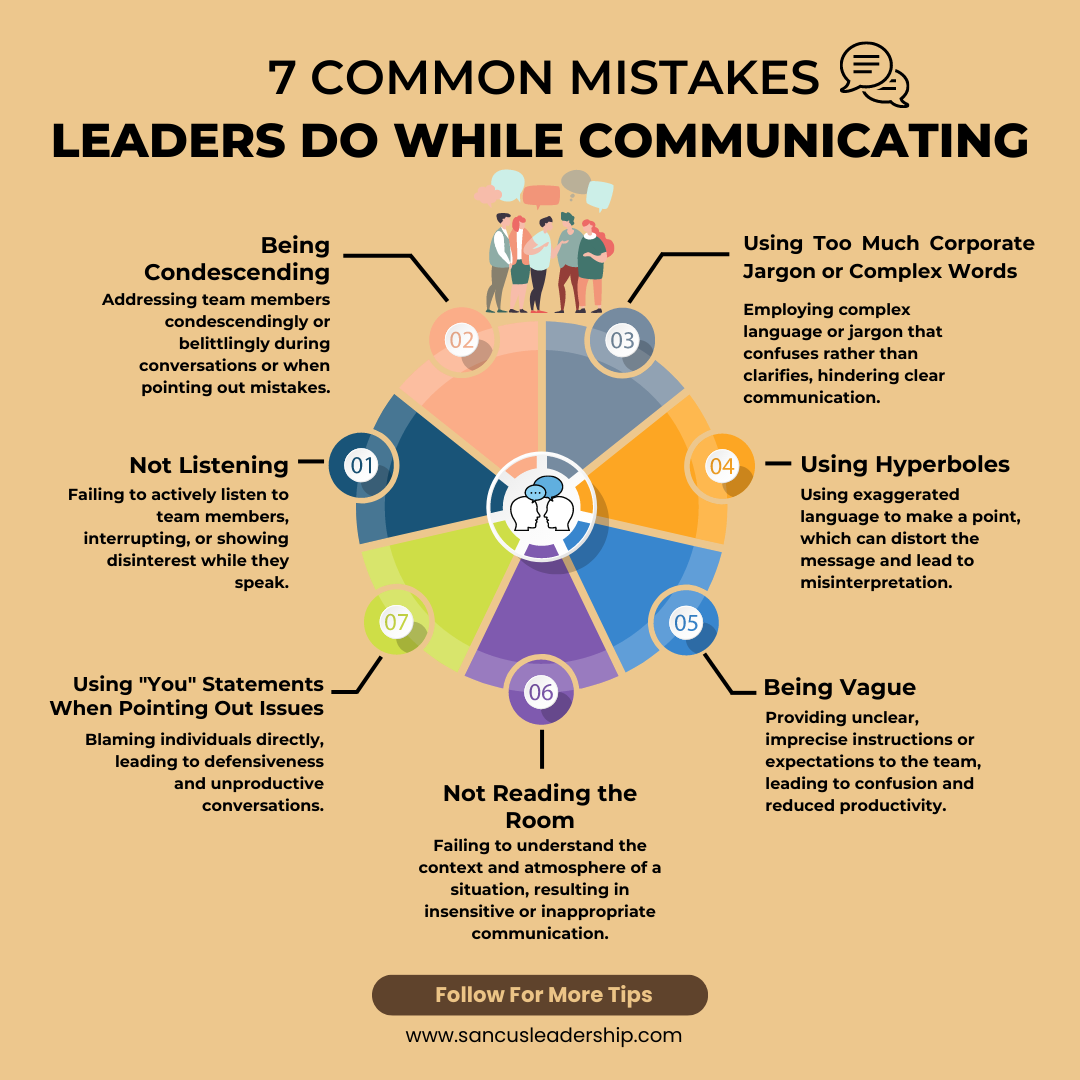I just completed my big five personality test and scored in the 1st percentile of people with low negative emotions, meaning in a room of a hundred people, I worry less than ninety-nine of them. This insight tells me that when my team is facing some tough times, I’ll shrug it off much more quickly than they will, and to be effective as a leader, I need to use language that lets them know I understand their worries and I have it covered.
Language is essential in your communication as a leader of a small team. To maximize internal motivation and minimize confusion, leaders must speak in a way that employees clearly understand and connect with. Words take different meanings in different contexts and with people of other personality traits.
Being a leader involves various duties, responsibilities, perks, and privileges. Many factors contribute to your leadership abilities, but the one thing that can make or break you is the language you use. Why is language important, and how can you improve your communication skills?
In the rest of this article, I will explain the importance of language for a leader and show you how different words can significantly affect how you communicate with your employees and peers. Additionally, I will show you some important facts and communication tips on what to do and not do as a leader.
Common Mistakes Leaders Can Make While Communicating

Naturally, finding the best language to communicate with the team you’re managing is a great challenge and a learning process. No rulebook can guide you to communicate perfectly with the people you are managing. Still, there are some things you can learn to avoid, according to the experience of other leaders and employees.
The mistakes on this list are from real-world situations. I have made them and see them almost every day, so chances are that you are also making some of them.

Being Condescending
Sometimes, people feel the need to address their team condescendingly or belittlingly when pointing out mistakes or just having casual conversations. This may be something they do people out of contempt or the need to establish their authority, but it’s wrong and ineffective.
The problem here isn’t usually that people want to be condescending; I more often find that it is just how they come off to their peers. Maybe it’s a facial reaction or a change of tone that discreetly gives the listener a sense of rejection.
It’s tough to understand sometimes if your message has been received negatively, especially if the subject being discussed is complex and takes up all of your brain capacity, not allowing you also to watch the reactions of your listeners.
If you don’t address this miscommunication, it most likely will lead to your employees losing their respect for you (since they believe you disrespect them). This happened to a colleague of mine who really struggled to communicate without sounding offensive.
The only reasonable solution I have found is to ask the listeners for feedback; after the session, ask them how you came off and whether something you said made them react in a certain way.
This will allow you to learn from every interaction and adapt your communication to the listener in a way that gets your message across without being offensive. This, of course, leads to less bitterness and resentment from your team.
Not Listening
When I was 21, I had a really good friend who would often look away or interrupt me while I was talking; this would piss me off. And the reason why it made me so mad wasn’t that the story I was about to tell was going to save the world, and I needed him to make it work.
No, it was because every time he did that, he showed me that whatever I had to say was always less important than whatever he had on his mind. This made me feel unimportant and disrespected.
So, when I see this type of poor communication in the workplace, it really enrages me, and I personally know how it impacts creativity and engagement in a team.
The (emotional) logic goes like this: Why should I listen to you if you don’t listen to me? As you can see, that creates a terrible working environment, making it almost impossible for high performance.
Some managers are not actually listening when employees talk; they are just waiting their turn to speak.
Your team needs to know that you actively listen to what they have to say, be it information, concerns, or ideas they might have. If you don’t have time to listen right now, tell them and set another time when you can engage with them.
When you consider what your team needs to say, you can provide helpful input that may solve their problems or improve the overall process.
Most importantly, you will make your team feel important, useful, and respected; you will start to forge unbreakable trust.
Active listening is a primary skill when building trust in a team.
Active listening is a primary skill when building trust in a team; that's why I created the Forging Unbreakable Trust program! Book a free discovery call and start forging trust today!
Using “You” Statements When Pointing Out Issues
As a leader, you’re supposed to let your team know when there’s room for improvement in their work. While addressing them, you must ensure that you don’t use “you” statements to single out individuals and make them defensive.
A common mistake is that leaders often say, “Here is where you failed,” or “This is where you went wrong.” As much as we think that our employees and ourselves aren’t easily offended, most of us will assume a defensive position if attacked.
Which I think we should since we are “under attack,” after all…
This offensive posture doesn’t allow the employee to engage fully with the exchange. Instead, they start thinking about how “it wasn’t my fault.” Even if they sound like they are being receptive by listening and looking interested, that tends to be a professionally taught response rather than a genuine internal openness.
Being defensive is such a negative term that many of us have developed ways of being defensive but not looking like we are.
The best way around this is to communicate smartly, focus on the practical problem when solving the situation, and focus on the individual when you want to develop your team. Don’t mix them.
Doing this will distinguish the person Jane from Jane’s performance outcome. Far more things than them impact the outcome as individuals: time available, support, external events, etc., so blending them isn’t just ineffective; it’s also the wrong level of analysis.
Use feedback and 1-on-1 sessions to work on personal development, such as improving communication or orderliness. You should use more “you” words and address the person’s character here.
“When you responded to me during the presentation yesterday, you spoke with a very high voice; I took it as if I had done something wrong?”
The same situation but with a technical focus and non-confrontational would be;
“During the presentation yesterday, the contrast of slides wasn’t strong enough, so I couldn’t clearly see the text. Would you mind changing that?”
As you might have noticed, both lines of communication end with a question. A great rule is to approach each situation as a scientist, someone who wants to understand the problem and learn more, not someone who already has the answers and wants to implement them.
Not Reading the Room
As I explained above, words can mean different things in different situations. Your responsibility as a leader is to understand what kinds of situations you’re in when communicating with the team you are managing.
You do not want to be the guy who runs into a room, takes over the conversations, and tells everyone a joke you heard, only to find out they are mourning the loss of a good friend.
This will make you look insensitive and uncaring of other people.
Understanding your context can impact how your team sees you and how respected they feel. Reading a room resembles active listening in some real sense.
Failing to understand the context you are in could also make you miss insights into what your audience is interested in (i.e., what they care about); this is what great comedians do; they start with a set of jokes, and when receiving wanted reaction, they continue down a route of similar jokes.
A better way to get in tune with the situation’s atmosphere is to see yourself as if it were the first day of a new job. Start by listening to the tone of the conversation. Is it upbeat or slow-paced? What is the discussion about? Are the people welcoming or distancing?
This will allow you to choose how to make your entrance and how to approach people in the room. Once you can competently read a room and adapt to the situation, you are much more likely to be organically engaged in the conversation and much and much less likely to be excluded and looked strangely upon.
Take a moment to read the room’s tone before speaking.
Using Too Much Corporate Jargon or Complex Words
The only reason I recommend you use a complex word is that when a specific term has a very narrow definition, and it is helpful to get your point across. But what is more common is when leaders use complex words to avoid doing something more challenging, communicating clearly and precisely.
Using complex words or jargon is a shortcut to confusion; what it means for you to think outside the box is different from what I mean.
This has happened to me many times during my military career. I have been encouraged to think outside the box, but the problem is that my commander’s box was usually much smaller than mine. But if they had clarified precisely where they wanted to change certain things, I would not have wasted so much time developing new ideas for areas they were unprepared for.
Instead of talking about this mysterious undefined box, I suggest that you specify what thinking outside the box doesn’t look like (because if you tell them what it looks like, then you’re basically just creating a new box).
For a company looking to increase its online following, thinking inside the box could mean continuing to post on TikTok and Instagram and looking for new trending topics to pursue.
Once you have defined the box, you can discover the options beyond its borders. The best part is you can do this without ever again mentioning that stupid, stupid box…
This will give your people a sense of direction and the autonomy to explore and discover new ways of doing while still maintaining the goal.
Some types of corporate jargon have become so overused in business environments that they have lost all meaning.
Using Hyperboles
Hyperbole doesn’t work well in a professional business environment. Some leaders may consider using it to alter their statements’ impact since exaggerating gives them more room to navigate if there is backlash later.
However fun and clever you might feel when using them, the hyperboles may change the communication process entirely and give the wrong message.
Being Vague
The leader informs the team about what they need to do and how they are supposed to achieve it. When you’re communicating with your team, you need to ensure they understand precisely what you require of them, so you should be as direct and detailed as possible. You risk your team’s productivity if you choose to be vague to cover your bases or avoid backlash.
| Communication Mistake | Description | Consequences |
| Being Condescending | Loss of respect, ineffectiveness in communication, potential bitterness, and resentment from the team. | Providing unclear instructions or expectations to the team leads to confusion and reduced productivity |
| Not Listening | Failing to actively listen to team members, interrupting, or showing disinterest while they speak. | Decreased creativity, engagement, and trust within the team; negative impact on the working environment |
| Using “You” Statements When Pointing Out Issues | Using accusatory “you” statements when discussing problems can lead to defensiveness and hinder productive conversations. | Defensive reactions, reduced engagement, avoidance of addressing issues effectively |
| Not Reading the Room | Failing to understand the context and atmosphere of a situation results in insensitive or inappropriate communication. | Perceived insensitivity, diminished respect, exclusion from conversations |
| Using Too Much Corporate Jargon or Complex Words | Employing complex language or jargon that confuses rather than clarifies, hindering clear communication. | Confusion, misunderstanding, and reduced effectiveness in conveying ideas and instructions |
| Hyperboles | Employing exaggerated language to make a point can distort the message and lead to misinterpretation. | Miscommunication, diminished credibility, and confusion about the actual situation |
| Being Vague | Providing unclear, imprecise instructions or expectations to the team leads to confusion and reduced productivity. | Confusion, lowered productivity, potential misunderstandings, and lack of direction |
Why Is the Use of Language Important for a Leader?

A leader’s main task is to provide the team with a goal and ensure the most effective way to get there. Misunderstanding is the main component of low productivity, creating team confusion, distrust, and frustration. This is why language is essential for leaders.
Communication is vital in a work environment, especially for leaders who manage and instruct different groups of people. Your language is the primary communication tool that allows you to convey your ideas, make decisions, and resolve issues. It may sound easy, but creating a common language to use is a challenge in itself.
In the military, this is emphasized on day one; we use commands such as “fire,” which are not to be given any other meaning other than to “pull the trigger of your gun.” This is for obvious reasons in an environment with such high risks.
But the same can be said in the corporate world; miscommunication can create severe implications and lead to people making career-ending decisions and putting people on the street. On average, small businesses lose $ 420,000 per year in revenue due to poor communication.
In your daily life as a leader, you have to deal with a large volume of information and different interactions in your relationships with multiple actors in your place of work, both internal and external. It takes a lot of work and talent to organize and filter all this information in a way that helps you communicate effectively with all the people involved.
The best way to avoid misunderstandings is to have clear and precise definitions of what words mean, “Fire” in the military context doesn’t mean starting a campfire or telling someone there is a fire; it solely means to fire your rifle.
Once you have built and trained your people to understand what the essential words in your business mean entirely, you have created a highly functioning internal language.
Once you have built and trained your people to understand what the essential words in your business mean entirely, you have created a highly functioning internal language.
This language will allow you to move faster since you won’t have to redo tasks that weren’t up to standard due to miscommunication, and you will avoid the biggest mistakes.
Why Different Word With the Same General Meaning Has Different Outcomes

In your daily life, you may need to pay more attention to the words you choose to use when communicating with your family or friends. Unless you’re dealing with a delicate situation, you probably say or write the words as they come to your mind.
However, when you become a leader, your words start to feel heavier and more impactful, making you realize that you must be thoughtful when addressing your team or colleagues. Language can be a powerful tool for a leader who knows how to use it. A crucial element of using your language to communicate in your workplace is your choice of words.
Language can be a powerful tool for a leader who knows how to use it. A crucial element of using your language to communicate in your workplace is your choice of words.
Words don’t exist in a vacuum; they are always associated with other situations and contexts that give them a certain connotation. For instance, studies have shown that even though cause and produce have similar meanings, cause seems to be perceived much more negatively than produce because it’s often used in a negative context (“causing an issue,” “cause of death,” etc.).
Words don’t exist in a vacuum; they are always associated with other situations and contexts that give them a certain connotation.
I love to describe things I find interesting with the word interesting (strange, I know…), but I have come to learn that when I work in the US and someone asks me, “What do you think?” then “It’s interesting” doesn’t fully express my genuine curiosity.
Instead, those words have an almost negative connotation, which I did not want to communicate. So, to communicate in a way that is received as I intended, I now usually speak in more descriptive terms, such as “It was complex, challenging, and I enjoyed doing it.”
It’s essential to consider the context and general perception of the words you will use while communicating. Different people may unconsciously pick up different meanings and implications from your words, so you must consciously decide which terms can better convey your message.
The Tangible Impact of Communication on Your Leadership

Reflecting on the benefits of communication and how important language is for every workplace becomes much easier when you can connect it to the actual effects it can have on your leadership and your team.
Your language directly affects several aspects of your work as a leader and manager of a team of people who aspire toward the same goal. Because communication is vital in every step, your language can make or break your leadership career. Let’s see some essential aspects that communication and language affect:
Performance and Discipline
When you lead, part of your assignment is to instruct your team and then assess their performance. The way you go about assessing performances has a direct impact on how fast your team improves and, consequently, how productive you all are.
Performance assessment is inherently an anxious, doubt-ridden moment for most team members. Hence, a good leader knows what language to use to point out issues and weaknesses without creating a hostile environment.
The same logic applies to enacting disciplinary policies. All team members are made aware of workplace conduct rules, but some may break these rules intentionally or unintentionally. This situation can be tricky for a leader who seeks to make the consequences of such actions clear while maintaining a friendly atmosphere in the workplace.
Motivation
Every leader should strive to motivate all team members to do their best. However, motivating a group of people with different personalities, dreams, and aspirations takes work. What works for some people doesn’t work for others, so you must find a way to motivate everyone.
The key is in the language you use. There are different types of motivational languages, and you may need to navigate several of them to find what works best for each team member. To find out what motivates your employees to do their best and work together toward a common goal, you should connect with them on a deeper level and go beyond business.
At Sancus Leadership, we spend much of our time trying to understand the why. Why do people show up for work? Why are they willing to endure the stress, and sometimes, why are they not?
If you can understand the why of your team, you can easily use that to build incredibly effective teams where everybody gives them all because it benefits the organization and themselves.
If you can understand the why of your team, you can easily use that to build incredibly effective teams where everybody gives them all because it benefits the organization and themselves.
As you connect with your team members, you realize what kind of language encourages more enthusiasm and positivity for each of them. As a result, you will have a roadmap to help you inspire every one of them in their own way.
When you are ready to build a team that truly connects with your leadership so you can stop wasting time on miscommunication and focus on income-generating activities, I invite you to book a free discovery call with me!
Employee Hiring and Retention
When interviewing people for positions on the team you’re managing, you’re looking for people who can impress you; however, you must remember that you, too, should impress your potential hire. You don’t want a great hire to pass on the opportunity based on a bad first impression.
As always, the language you use when communicating with potential hires is crucial for creating a good image in their eyes. Your language will tell them more about what your team is like, what you expect of them, and your company’s general environment.
Consequently, employee retention is also affected by this crucial element. If your language cannot convey precisely what the job you’re offering entails, your new hire may accept the position based on the wrong impression, which means they might leave sooner or later to find something that suits them better.
Tips About Communicating as a Leader

There’s much to be said about what not to do as a team leader. However, the experience can also tell you a lot about what may work for your leadership process and improve your team’s performance.
Here are some valuable tips that could help you improve your communication and language usage:
- Find your voice. While figuring out your leadership style, you may need to communicate in more organic ways. Stick to it once you find out what kind of language suits your style. People appreciate authenticity and sincerity.
- Be assertive. Finding a balance between being passive, assertive, and aggressive in communication is essential. As a leader, you should inspire and motivate but also seek discipline and tangible results.
- Eye contact is vital. The most basic rule of communicating is maintaining eye contact. It’s a simple thing to do but essential in creating a connection while speaking to one another. The language you use can be lost without the proper body language.
- Be the initiator of difficult conversations. Every project will have complex topics that should be carefully breached. You are responsible for initiating the most challenging and delicate conversations because you are the leader.
- Speak with actions. There is no point in your communication and language tips and techniques if you don’t do what you say. If actions do not follow your words, you will no longer be a credible leader in the eyes of your team.
Productivity expert Adriana Girdler shares some valuable tips in this video on how to become a better leader by improving your communication skills at work.
Final Thoughts
Your leadership depends a lot on your communication and language skills, so you should carefully consider every word you use when speaking to the team you manage. Words can have different meanings and connotations in different circumstances, and choosing the wrong one can be detrimental in a workplace environment.
In order to communicate effectively, you should listen to your team and read the tone of every situation. Additionally, it would help if you were authentic and assertive as a leader.



